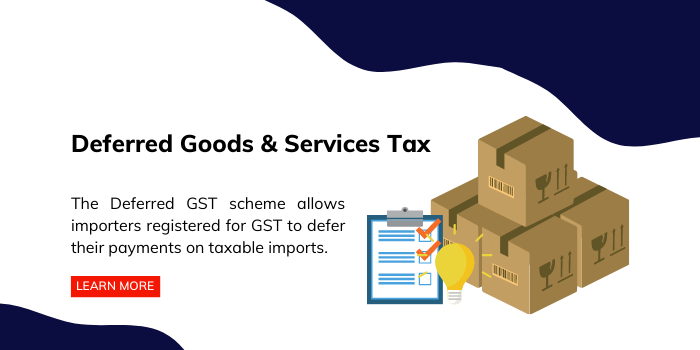Deferred GST Explained

When goods are imported into Australia, whether through a freight forwarder or individual company, the importer typically has to pay Goods and Services Tax (GST) at the time the goods enter the country. In all instances, GST must be paid upfront before Australian Customs release the goods to deliver to your door.
However, Australia has a deferral scheme in place for GST on imports. The Deferred GST (DGST) scheme allows importers to defer paying GST on all taxable imports into the country.
If questions like how could this benefit me and my business? Or what is the eligibility for the DGST scheme? ring into your head, then this article is for you. Below will provide a detailed overview on what the DGST scheme is, the advantages of registering for it and who is eligible.
What is the Deferred GST (DGST) Scheme?
As an importer, the Deferred Goods and Services Tax (DGST) scheme allows you to defer payment of GST on all taxable imports into Australia.
Ordinarily, any goods will not be released from Australian customs until all GST is paid to them. This can have a significant negative impact on many businesses cash flow as they are fronting the cost before sale. When the cargo arrives at Australian customs, you must have the funds straight away to pay the GST at the time of import. Importers can clear credit for the GST paid at a later date. This is why the Deferred GST scheme is beneficial for many importing into Australia.
Before being able to defer your GST, importers must apply to the Australian Taxation Office (ATO) for approval.
To apply to defer GST:
- Check your eligibility
- Apply to defer your GST
- Wait three days for the Australian Border Force (ABF) to approve your application.
If you are registered for the Australian Tax Office’s DGST scheme, you are able to defer GST payments until the due date of your next Business Activity Statement (BAS).
You are able to offset your GST owning against GST paid on the sale of goods.
What are the Advantages of Deferring GST?
· Improving your cash flow
For a lot of business owners, cash flow is at the forefront of their mind. That’s why generating as much cash flow is imperative. Using the DGST scheme allows business owners to defer their GST when importing into Australia, begin to sell their goods after clearance and then pay the deferred GST with collected GST from goods sales.
The ATO requires each company registered for DGST to complete their Monthly BAS statements within 21 days of the month ending.
This leaves the opportunity to sell the imported products with GST to your customers, and then offset the collected GST against the owing GST, overall reducing your GST payments.
By deferring the GST, you can gain access to your goods from customs straight away and then immediately start selling them to your customers.
· Saving time
Once a company has registered for DGST scheme, this is automatically lodged with Australian customs. This saves time as it allows customs to process your goods quicker as you are not required to pay GST on arrival for your goods. This allows you to settle other freight payments quicker, such as port charger, sea freight charges, so you goods can be released as soon as possible.
Who is Liable for GST payments?
The importer is liable for GST regardless of whether it is registered or carrying on an enterprise.
However, a GST-registered importer who imports the goods in carrying on its enterprise will generally be entitled to input tax credits (ITCs) for the GST payable. Although the ITCs will ultimately offset the importer’s GST liability on the importation, they will only be available when the importer lodges its BAS for the relevant period. The timing difference means the importer may be out of pocket for almost two months (if a monthly lodger) or almost four months (if a quarterly lodger).
In some cases, a GST-registered importer will not be entitled to input tax credits for the imported goods. This occurs when the imports are made in relation to input taxed or private or domestic supplies.


